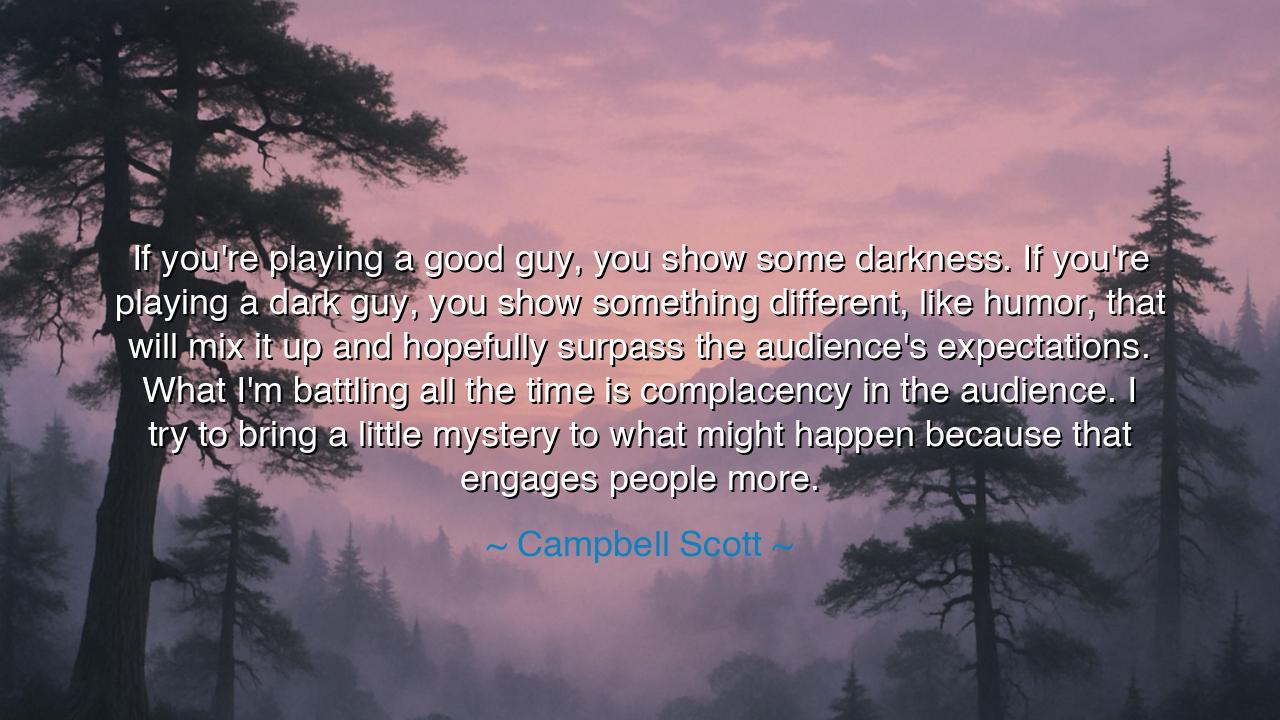
If you're playing a good guy, you show some darkness. If you're
If you're playing a good guy, you show some darkness. If you're playing a dark guy, you show something different, like humor, that will mix it up and hopefully surpass the audience's expectations. What I'm battling all the time is complacency in the audience. I try to bring a little mystery to what might happen because that engages people more.






Hear the words of Campbell Scott, an actor of depth and subtle fire: “If you're playing a good guy, you show some darkness. If you're playing a dark guy, you show something different, like humor, that will mix it up and hopefully surpass the audience's expectations. What I'm battling all the time is complacency in the audience. I try to bring a little mystery to what might happen because that engages people more.” In this reflection lies the eternal art of balance — the weaving of light and shadow within the human soul. For Scott, who walks the path of the storyteller, this wisdom is not about performance alone, but about the very nature of truth: that the heart of life itself is found in complexity, and that to reveal only one side of the soul is to lie to the world.
The origin of this quote rests in the craft of acting, but its roots reach deeper — into philosophy, into the understanding of human nature. Campbell Scott, son of the great George C. Scott, learned early that to portray life with honesty, one must embrace contradiction. A “good” character that is too pure rings false; a “villain” without humanity becomes hollow. Thus, he sought to “mix it up,” to surprise, to awaken the sleeping mind of the audience that too easily drifts into judgment. His battle is against complacency — not only in art, but in perception itself. For just as a dull actor lulls his audience to sleep, so too does a complacent society lose sight of the truth that every soul contains both virtue and vice.
This teaching echoes the wisdom of the ancients. The Greek dramatists — Sophocles, Euripides, Aeschylus — knew that tragedy and nobility are not opposites but reflections of each other. In their plays, kings fell through their pride, and villains wept through their love. The poet’s purpose was not to flatter the audience, but to reveal the mystery of being human — the tension between darkness and light. Campbell Scott’s words carry this same inheritance. He reminds us that art’s power lies not in confirming what we expect, but in shattering it. A character who is too predictable becomes lifeless; a story without surprise loses its soul. Likewise, a life without contradiction loses its depth.
Consider the example of Hamlet, that eternal prince of Denmark. He is noble, yet uncertain; courageous, yet tormented by doubt. He is both light and shadow, saint and skeptic, lover and destroyer. Were he only virtuous, he would be dull; were he only vengeful, he would be monstrous. But because he contains both — because he embodies the contradictions of human nature — he lives forever in the hearts of those who behold him. This is what Scott seeks in his art: the mystery that keeps the audience leaning forward, hearts awake, minds alive. The actor, like the philosopher, must hold the mirror to truth — and truth is never one color.
To “battle complacency” is, in truth, to battle death of the spirit. For complacency is the quiet rot that spreads through all creation when curiosity fades. The audience that ceases to wonder ceases to feel; the person who ceases to question ceases to grow. Campbell Scott’s call is a call to the artist in every soul — the voice that says, “Do not settle for what is expected. Surprise, challenge, awaken.” Whether in the theater or in life, the task is the same: to refuse simplicity, to refuse stagnation, to live in such a way that the world is constantly stirred by your presence.
There is also profound humility in this teaching. When Scott says he brings “a little mystery,” he acknowledges that mastery in art, as in life, is not control, but openness — the courage to let uncertainty breathe. Mystery engages because it honors the audience as participants, not spectators. It invites them to feel, to think, to fill in the spaces with their own humanity. Likewise, in our daily lives, we must leave room for others to surprise us — to be more than their roles, more than our expectations. For every person you meet carries unseen depths, and the greatest sin against truth is to think we have already understood them.
O listener, take this teaching to heart: live as Campbell Scott performs — with depth, curiosity, and a spark of mystery. Do not show only your goodness; let others see your shadows, for that is honesty. And if darkness defines you, let them glimpse your light, for that is redemption. Challenge the complacency of those around you by living with authenticity — unpredictable, alive, and real. Be a mirror that reflects not perfection, but truth. For the soul that embraces its contradictions becomes not fragmented, but whole.
Thus, let Campbell Scott’s words endure as both artistic and moral law: “If you’re playing a good guy, show some darkness. If you’re playing a dark guy, show something different.” In every act of creation, in every relationship, in every breath of being — remember that life itself is the mingling of opposites. To reveal both is to be fully human; to conceal one is to live only half awake. So bring a little mystery to all that you do, and you will awaken the hearts of those who have forgotten how to feel.






AAdministratorAdministrator
Welcome, honored guests. Please leave a comment, we will respond soon